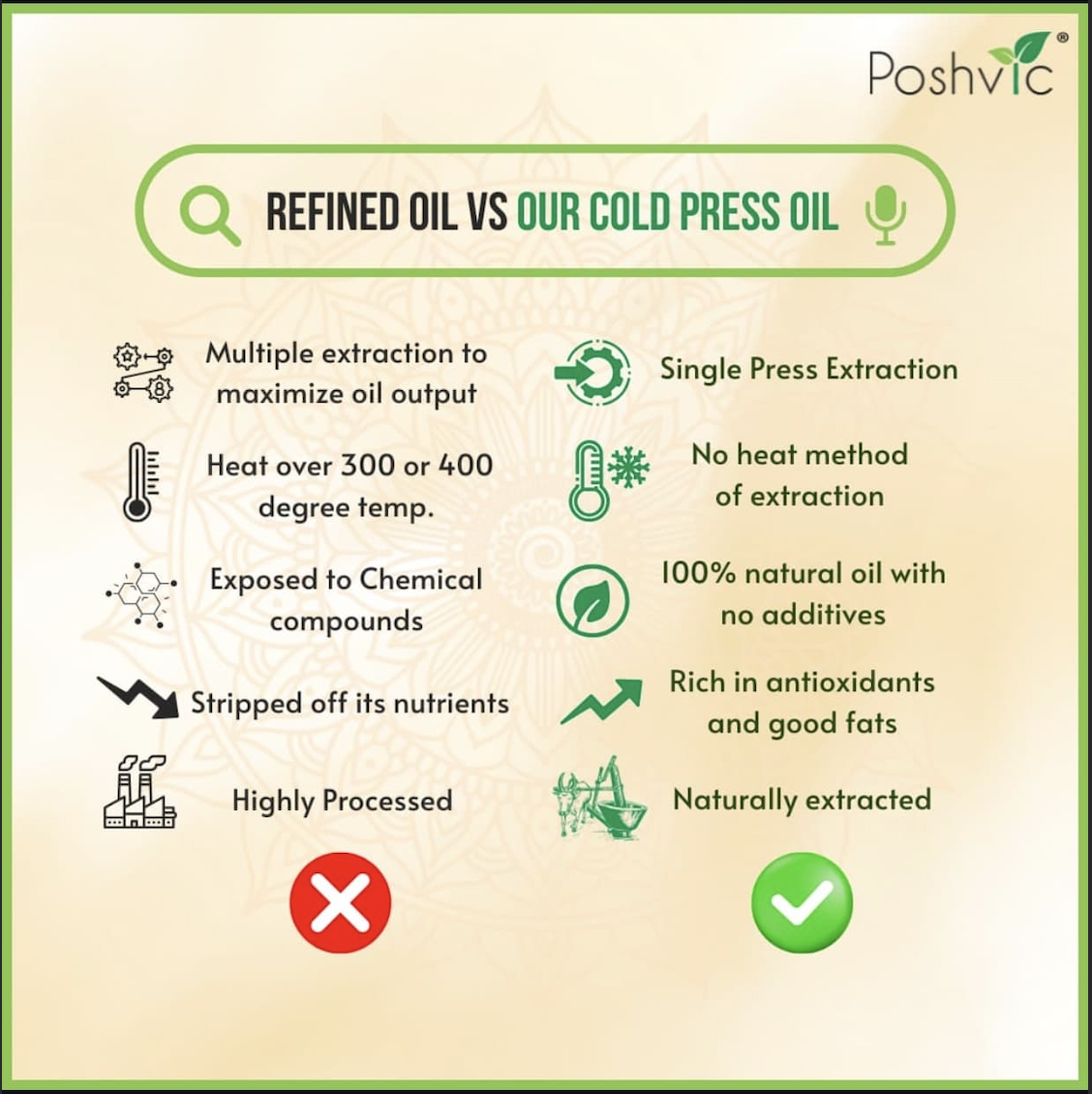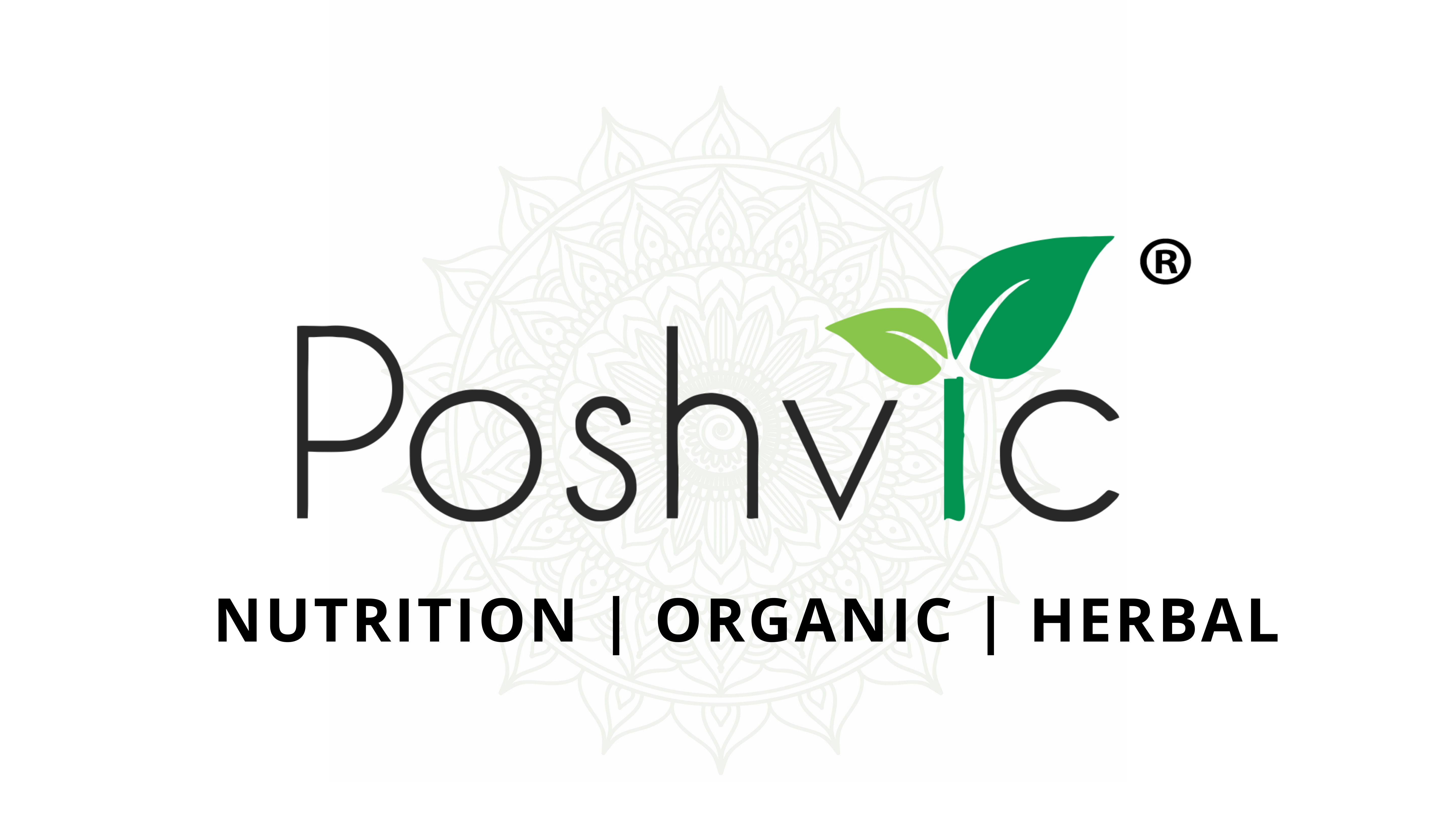





Keep this story going! Share below!
Vijeta Lifecare, through its Poshvic brand, is a food and nutrition company that provides natural and healthy products, with a focus on traditional wood-pressed oils. This business solution addresses UN Sustainable Development Goals by promoting sustainable production and consumption patterns through its focus on quality, transparency, and a circular economy approach. By sourcing directly from farmers, it also supports sustainable agriculture and provides consumers with nutrient-rich food for improved health and well-being.
The innovative solution Poshvic has introduced to support the UN SDGs and a better world is its modernized wood-pressing technique and the transparent business ecosystem built around it. The founder, Tarang Sachdeva, recognized the need to move away from modern, high-heat expeller machines that can destroy the nutritional value of oils. Poshvic's process revives the traditional "kolu" or "ghani" method, which uses a wooden press to extract oil slowly at low temperatures, preserving its natural aroma, flavor, and nutrients.
This method is not just a nod to tradition but a specific, innovative solution for multiple SDGs. For Goal 12 (Responsible Consumption and Production), the process is inherently sustainable. The business minimizes waste by using the leftover oil cake (DOC), a nutrient-rich by-product, as animal feed, creating a circular economy. This practice ensures that valuable resources are not discarded but are instead put to good use, benefiting the wider ecosystem. The company's transparency, exemplified by its live milling concept in Delhi, builds trust with customers and promotes informed consumption, aligning with the goal of ensuring sustainable consumption patterns.
Additionally, Poshvic's model addresses Goal 3 (Good Health and Well-being) by offering a healthier alternative to refined oils, which have been processed with high heat and chemicals. This helps consumers make better dietary choices, contributing to their overall health. The brand also contributes to Goal 9 (Industry, Innovation & Infrastructure) by demonstrating a scalable and replicable model for sustainable industrialization that is both profitable and beneficial to society. This approach proves that business can be a powerful agent of positive change by blending traditional wisdom with a modern, purpose-driven mission.

Tarang Sachdeva's inspiration to found Poshvic was a deeply personal journey, fueled by a long-held entrepreneurial ambition and a pivotal realization about the state of the food industry. Even before his time at GIM, he always knew he wanted to start his own business. His motivation wasn't just to build a company but to create a brand that offered genuine value and quality, a passion that was further ignited by his travels and observations during his corporate career. He saw a significant gap in the market where mass-produced, low-quality products were prevalent, and he recognized an opportunity to do something different. The final push came during the COVID-19 pandemic, which underscored the critical link between diet and health. This event crystallized his vision, leading him to fully commit to a venture focused on natural, wholesome food.
Tarang's journey wasn't without its challenges; he noted that the time he spent in the corporate world, though valuable, was also a period where he felt he was "wasting [his] time" because of his greater entrepreneurial ambition. His inspiration was also heavily influenced by his experiences on the ground. He mentioned that a campus project in Goa, which involved visiting farms, was a key moment. It opened his eyes to the realities faced by farmers and the potential for a business that could support them directly. He saw firsthand the disconnect between producers and consumers and was inspired to build a brand that could bridge that gap with transparency and trust.
In the interview, he shared that his desire to create something on his own was a constant drive. He said, "I always had in mind that I will have to come back and start something of my own". He also reflected on his past experiences, saying that his time in the corporate world was "late for [him]" because he always knew he wanted to pursue his own venture. This deep-rooted personal motivation is the true cornerstone of Poshvic's mission and success.
Poshvic's innovation has created significant positive impacts on its business, society, and the environment. These effects are both short-term and long-term, and are supported by the following evidence:
Short-Term Effects & Evidence
Business Impact: In the short-term, the company successfully built a loyal customer base through its transparent business practices. By offering a live milling experience at "The Poshvic Mills," the business earned the trust of consumers who were able to see the production process firsthand. This transparency has been a major driver of growth, attracting customers who value quality and purity.
Societal Impact: Poshvic's model is educating consumers and shifting behavior. The founder noted that people are now more aware and are finally looking at nutritional facts and labels. One customer, for instance, reported that his daughter, who suffered from hair loss, saw significant improvement after switching to Poshvic's natural oils, a testament to the product's effectiveness. This positive feedback from customers serves as powerful evidence of the product's direct impact on health and well-being.
Environmental Impact: The company’s focus on sustainable production has an immediate effect on waste reduction. By using the leftover oil cake as a nutrient-rich animal feed, Poshvic is minimizing waste and supporting local animal husbandry. This practice ensures that a valuable byproduct is not discarded but is instead returned to the ecosystem. .
Long-Term Effects & Evidence
Business Impact: The long-term business benefit is the establishment of a sustainable, premium brand that is positioned for future expansion. The company's focus on quality over price has created a strong foundation that is not easily undercut by cheaper, lower-quality competitors. The founder plans to leverage this reputation to scale the live milling concept across India and partner with other brands for private labeling. The fact that they can sell directly to consumers at a factory rate, while still maintaining profitability, is a strong indicator of a successful long-term business model.
Societal Impact: In the long run, Poshvic's model could help create a healthier society by encouraging a mass shift towards healthier consumption patterns. By supporting farmers directly, the company is not only ensuring fair prices but is also contributing to the long-term sustainability of local agriculture, a key pillar of a flourishing society.
Environmental Impact: The company's commitment to using natural, sustainable production methods has the potential to influence the entire industry. As the founder stated, their model is scalable, which means that the positive environmental impacts—such as reduced waste and reliance on harmful processing—can be replicated on a much larger scale, leading to a greener and more sustainable food industry for future generations.
The business focuses on providing a quality, transparent product, hence, Poshvic has experienced significant business benefits. The company has successfully created a strong brand identity that resonates with health-conscious consumers. By avoiding investment from external investors so far, Poshvic has remained an unfunded company, which allows it to maintain its core mission and values without external pressure. The brand’s focus on a mission-driven approach to business aligns with the growing trend of socially responsible investing, which could make it an attractive option for investors in the future. The company's expansion to 80 different products demonstrates its ability to create a diverse and resilient product portfolio.
The wood pressing technique is a mechanised version of the traditional bail-kolu method, operating at a slow speed of 10 to 12 RPM. Unlike modern expeller machines that operate at high temperatures of over 250 to 300 degrees Celsius—which can burn off nutrients—this method preserves the seeds' natural nutrition, flavour, and aroma. As a result, the oils produced are free from trans fats and cholesterol. The innovation promotes a complete sustainability ecosystem. The de-oiled cake (DOC), a byproduct of the process, is rich in nutrition and good fats. This high-quality DOC is provided to animal farms (Gaushalas), ensuring the animals receive proper nutrition, improving the quality of dairy products, and completing a natural cycle.
This approach has also created new markets and opportunities. The founder noted they were able to expand their footprint from Delhi to Mumbai, Pune, Chennai, and even cities in the Northeast, showcasing their scalability and market reach. According to Tarang, Poshvic's products are available in more than 700 stores across Delhi NCR. Poshvic's growth has also led to job creation. The company had 27 employees as of April 30, 2025, representing a 50% increase from the previous year. Furthermore, Poshvic has become a source of inspiration for other brands, with several companies approaching them for private labelling and training on their processes. This demonstrates that their innovative model is not just beneficial for them, but it is also creating new opportunities for collaboration and growth within the industry.
Poshvic’s innovation directly addresses critical societal and environmental challenges, transforming a business operation into a force for positive change. On a societal level, the company contributes to Good Health and Well-being (SDG 3) by offering consumers a healthier alternative to conventional, mass-produced oils. Many modern food products are processed with high heat, which depletes their nutritional value. Poshvic’s commitment to the traditional wood-pressing technique ensures that its oils retain their natural nutrients, providing a purer and more wholesome product. This helps combat the growing health issues linked to poor nutrition and contributes to a more informed, health-conscious populace.
In addition, the brand’s ethical business practices extend to the supply chain, benefiting the agricultural community. By directly sourcing raw materials from farmers and a lot of farmers that are from different states, Poshvic ensures fair compensation and a stable market for their produce, which can contribute to reducing poverty and supporting sustainable livelihoods.
The environmental benefits of Poshvic’s model are significant and align with Responsible Consumption and Production (SDG 12). The core of this benefit lies in the company's circular economy approach. The wood-pressing process generates a valuable byproduct: oil cake, which is the residue left after the oil is extracted. Instead of treating this as waste, Poshvic provides it for animal feed, ensuring that all parts of the raw material are used efficiently. This practice helps to reduce waste and its negative environmental impacts, such as the release of methane—a potent greenhouse gas—from decomposing food waste in landfills.
Furthermore, Poshvic's transparency encourages responsible consumption by educating customers on the benefits of sustainably produced goods. The brand's emphasis on natural, clean, and green products promotes a lifestyle that respects traditional methods and the environment. This not only contributes to a healthier ecosystem but also helps conserve natural resources like water and land that are often over-utilized in conventional food production systems. By proving that a business can be both profitable and environmentally responsible, Poshvic's innovation serves as a model for a more sustainable and conscious food industry.
Get stories of positive business innovations from around the world delivered right to your inbox.
Tarang Sachdeva, Founder


Vijeta Lifecare is a food and nutrition company that operates under the brand name Poshvic. Established in 2020, the business aims to provide healthy, natural food products, with a focus on cold-pressed oils. Poshvic's mission is to enhance well-being by offering high-quality, traditionally made products and promoting a healthier lifestyle. The brand has expanded its portfolio to over 80 products, showcasing its rapid growth and adaptability in the market.